"Cherishing Little Steps - A Haven for Baby and Family Journeys"
Healthy Fats for Infants
Did you know that healthy fats play a crucial role in the development and growth of infants? It may come as a surprise, but incorporating the right fats into your baby's diet can have significant long-term benefits for their overall health.
From supporting brain development to aiding in growth, healthy fats are a key ingredient in your little one's nutrition.
But which fats are the best for your baby? Stay tuned as we explore the world of healthy fats for infants and uncover the top choices that will nourish your baby's body and mind.
Key Takeaways
- Healthy fats, such as omega-3 and omega-6 fatty acids, are essential for brain development and immune function in infants.
- Breast milk and infant formulas are sources of healthy fats for infants, but solid foods like avocado and nut butters can further support their nutrition.
- Omega-3 fatty acids, especially DHA, are crucial for cognitive development in infants, and higher levels of DHA are associated with better cognitive outcomes.
- Monounsaturated and polyunsaturated fats promote digestive health, skin health, and overall growth in infants, and can be found in foods like avocados, olive oil, nuts, and fatty fish.
The Role of Healthy Fats in Infant Nutrition
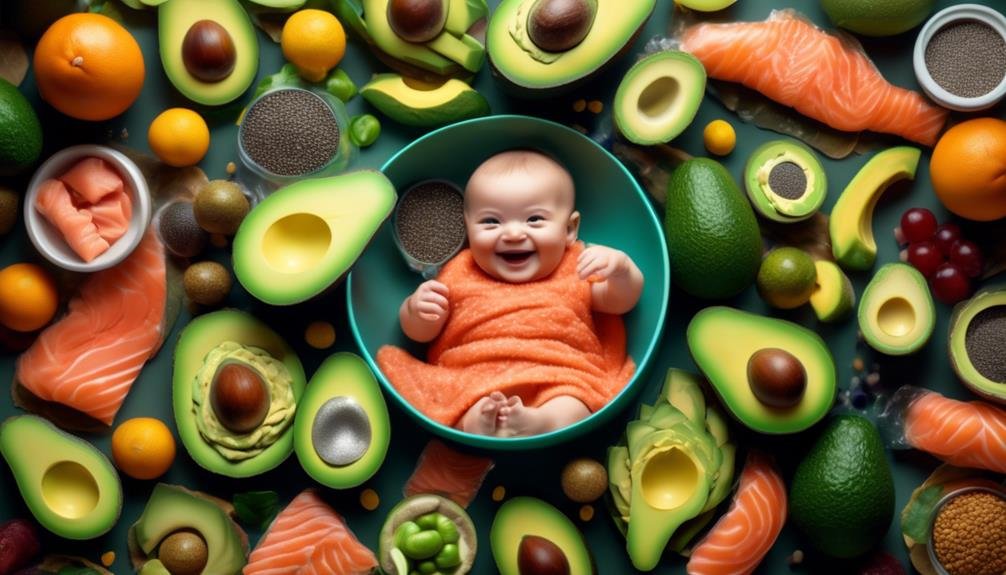
Healthy fats play a vital role in the nutrition of infants, providing essential nutrients for their growth and development. One important component of healthy fats for infants is essential fatty acids.
These are fats that the body can't produce on its own and must be obtained from the diet. Essential fatty acids, such as omega-3 and omega-6, are crucial for brain development, immune function, and overall cell function.
When it comes to making healthy fat choices for infants, breast milk is considered the gold standard. Breast milk naturally contains the right balance of fats, including essential fatty acids, to support an infant's development. If breastfeeding isn't possible, infant formulas are designed to mimic breast milk and provide the necessary fats for optimal growth.
In addition to breast milk or formula, introducing solid foods that are rich in healthy fats can further support an infant's nutrition. Avocado, for example, is a great source of monounsaturated fats, which are beneficial for heart health. Other healthy fat options include pureed nut butters, such as almond or peanut butter, which provide essential fatty acids and protein.
It is important to note that while healthy fats are beneficial for infants, it's equally important to avoid excessive fat intake. Moderation and balance are key when it comes to incorporating healthy fats into an infant's diet. Consulting with a pediatrician or registered dietitian can help ensure that the right amount of healthy fats is included in an infant's nutrition plan.
Essential Fatty Acids for Baby's Brain Development
Breast milk or formula provides the necessary essential fatty acids for your baby's brain development. These fatty acids, particularly omega-3 and omega-6, play a crucial role in supporting your baby's cognitive development during early childhood.
Omega-3 fatty acids, such as DHA (docosahexaenoic acid), are especially important for your baby's brain development. They help build the structure of brain cells and support the formation of neural connections. Research suggests that higher levels of DHA in infants are associated with better cognitive outcomes later in life.
To emphasize the importance of healthy fats in your baby's early development, let's take a look at the following table:
| Importance of Healthy Fats in Early Childhood |
|---|
| Supports Brain Development and Function |
| Enhances Cognitive Abilities and Learning |
| Promotes Healthy Vision and Eye Function |
| Aids in the Development of Nervous System |
| Supports Overall Growth and Development |
Omega-3 Fatty Acids: A Must-Have for Infants
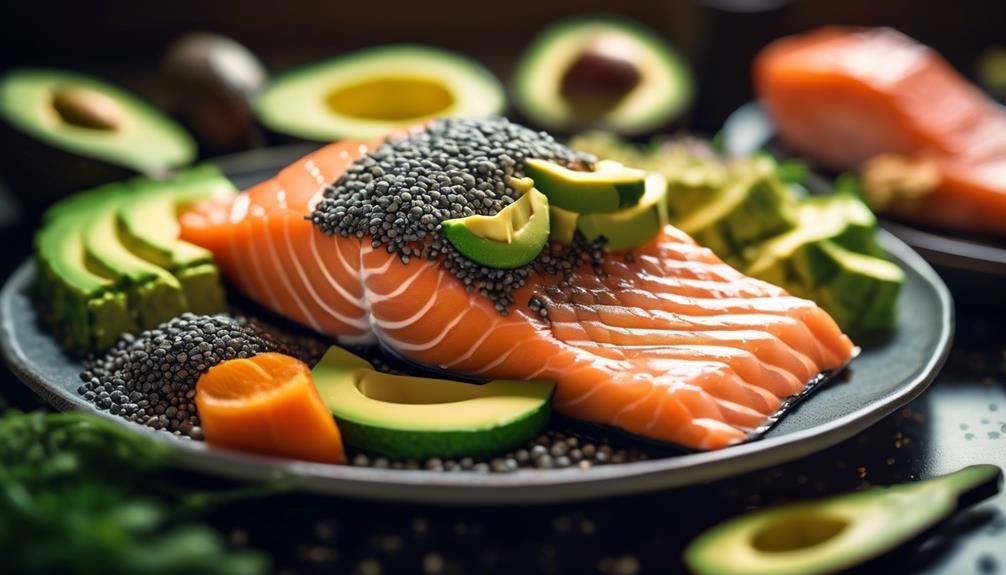
To ensure optimal development, your baby requires a steady intake of omega-3 fatty acids. These essential fats play a crucial role in brain development and function. Omega-3 fatty acids, particularly docosahexaenoic acid (DHA), are vital for the growth and maturation of your baby's brain and nervous system.
Research has shown that infants who consume sufficient amounts of omega-3 fatty acids tend to have better cognitive and visual development. DHA makes up a significant portion of the brain and is essential for its structure and function. It promotes the growth of nerve cells, supports synaptic connections, and enhances overall brain health.
Incorporating omega-3 fatty acids into your baby's diet can be easily done by introducing foods rich in these healthy fats. One excellent source is avocado. Avocados aren't only packed with omega-3 fatty acids but also provide essential nutrients like vitamin E and potassium. You can mash or puree avocado and offer it as a spread on toast or as a topping for fruits and vegetables.
The Benefits of Monounsaturated Fats for Babies
Incorporating monounsaturated fats into your baby's diet offers numerous benefits for their overall health and development. Here are three important reasons why you should consider including these healthy fats in your little one's meals:
- Benefits of monounsaturated fats for baby's digestion: Monounsaturated fats, found in foods like avocados, olive oil, and nuts, can help promote a healthy digestive system in infants. These fats are easily digested and can provide a source of energy for your baby. They also help to absorb important fat-soluble vitamins, such as vitamins A, D, E, and K, which are crucial for your baby's growth and development.
- Monounsaturated fats for promoting healthy skin in infants: Your baby's skin is delicate and requires proper nourishment to stay healthy. Monounsaturated fats help maintain the integrity of the skin by providing essential fatty acids that support its structure. Including foods rich in monounsaturated fats, like salmon and sunflower seeds, can contribute to your baby's healthy and smooth skin.
- Supports brain development: Monounsaturated fats contain omega-9 fatty acids, which play a vital role in brain development. These fats are essential for the growth and functioning of your baby's brain cells. By incorporating monounsaturated fats into your baby's diet, you can support their cognitive development and help them reach their full potential.
Polyunsaturated Fats: Supporting Baby's Growth
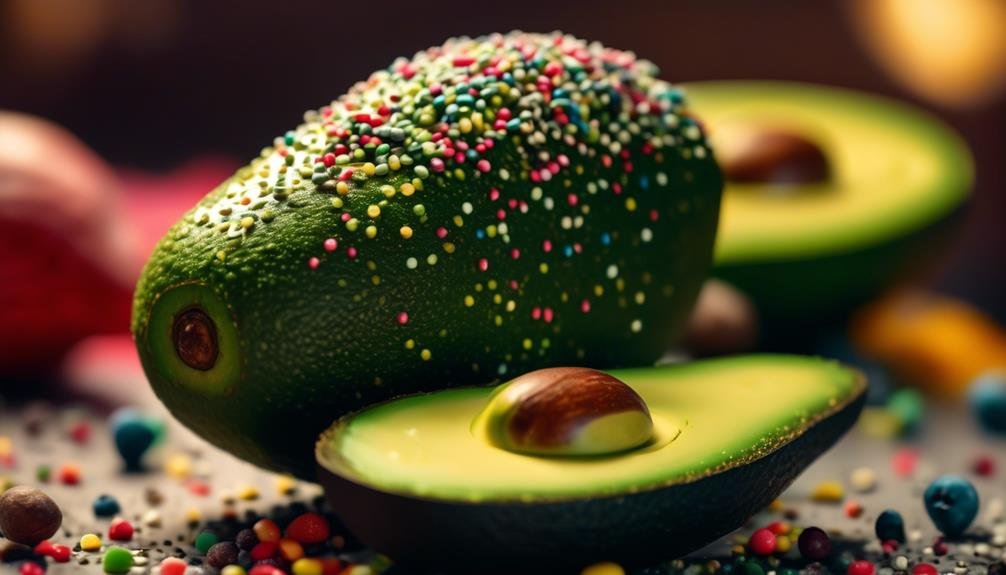
Polyunsaturated fats play a crucial role in supporting your baby's growth and development. These healthy fats are essential for brain development and function, as well as for overall growth and maintenance of the body. Incorporating polyunsaturated fats into your baby's meals is important to ensure they're getting the right nutrients for optimal development.
One type of polyunsaturated fat that's particularly important for brain development is omega-3 fatty acids. These fats are found in fatty fish like salmon, sardines, and mackerel, as well as in walnuts and flaxseeds. Omega-3 fatty acids have been shown to support brain health, cognitive function, and even improve attention and behavior in children.
Another type of polyunsaturated fat is omega-6 fatty acids, which are found in vegetable oils like soybean, corn, and sunflower oil. These fats are important for growth and development, as well as for maintaining healthy skin and hair.
To incorporate healthy fats into your baby's meals, you can add mashed avocado to their purees or serve them steamed fish as a finger food. You can also use olive oil or coconut oil in cooking and baking to provide additional healthy fats.
Incorporating Avocado Into Your Baby's Diet
One way to introduce healthy fats into your baby's diet is by incorporating avocado. Avocado is a nutritious fruit that's rich in monounsaturated fats, which are essential for your baby's growth and development.
Here are three ways you can incorporate avocado into your baby's diet:
- Avocado puree: Mash a ripe avocado until smooth and creamy. You can serve it as a standalone puree or mix it with other fruits or vegetables to enhance the flavor and texture. Avocado puree can be a great addition to your baby's meals and snacks.
- Avocado toast: Spread mashed avocado on whole grain toast and cut it into bite-sized pieces for your baby to enjoy. This simple and nutritious snack is packed with healthy fats and fiber.
- Avocado as a substitute: Avocado can be used as a healthy alternative to butter or mayonnaise in recipes. You can use mashed avocado as a spread on sandwiches or as a topping for baked potatoes. It adds a creamy texture and a delicious flavor to your baby's meals.
Incorporating avocado into your baby's diet is a great way to introduce healthy fats and provide essential nutrients. Try these avocado recipes and alternatives to support your baby's growth and development.
Nut Butter: A Nutritious Fat Source for Infants

Nut butter is a nutritious and delicious source of healthy fats for infants. While there are nut butter alternatives available, such as sunflower seed butter or soy nut butter, traditional nut butters like almond butter or peanut butter can provide essential nutrients for your baby's growth and development.
Infants need healthy fats for optimal brain development and overall growth. Nut butters are rich in monounsaturated and polyunsaturated fats, which are considered heart-healthy fats. These fats are important for the absorption of fat-soluble vitamins and the production of essential hormones.
When introducing nut butter to your baby, it's important to consider their age and any potential allergies. It's recommended to wait until around six months of age before introducing nut butter. Start with a small amount and observe for any signs of allergic reactions, such as rash or difficulty breathing. If there's a family history of nut allergies, consult with your pediatrician before introducing nut butters.
The impact of healthy fats on infant digestion is significant. Healthy fats can help in the absorption of nutrients and promote healthy bowel movements. They also provide a feeling of satiety, which can help regulate your baby's appetite.
Introducing Olive Oil to Your Baby's Meals
Now let's explore another nutritious fat source for your infant's meals: introducing olive oil.
As you start introducing solid foods to your baby, it's important to include healthy fats in their diet to support their growth and development. Olive oil, a staple in the Mediterranean diet, is a great choice for nourishing your baby's brain and providing them with essential nutrients.
Here are three reasons why you should consider adding olive oil to your baby's meals:
- Brain development: Olive oil is rich in monounsaturated fats, which are important for the development of your baby's brain. These fats support the growth and function of brain cells, helping your little one reach their cognitive milestones.
- Vitamin E: Olive oil is a great source of vitamin E, a powerful antioxidant that protects cells from damage. Vitamin E is essential for your baby's overall health and can support their immune system as they explore new foods and environments.
- Easy digestion: Olive oil is easily digested by babies, making it a gentle addition to their meals. It can help with the absorption of fat-soluble vitamins and promote healthy digestion, ensuring your baby gets the nutrients they need from their food.
Remember to introduce olive oil gradually and in small amounts, mixing it with other foods to enrich their taste and texture. Always consult with your pediatrician before making any changes to your baby's diet.
Chia Seeds: A Superfood for Baby's Health
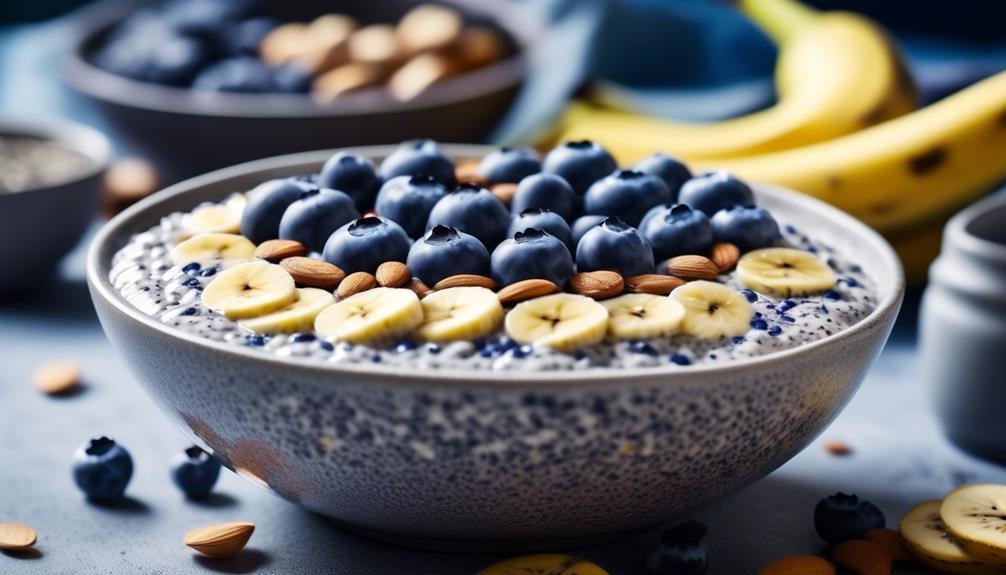
Introducing chia seeds into your baby's diet can provide a wealth of health benefits. Chia seeds are considered a superfood because they're packed with essential nutrients that support your baby's growth and development. These tiny seeds are an excellent source of omega-3 fatty acids, which are crucial for brain development and cognitive function. They also contain fiber, protein, and antioxidants, all of which contribute to a healthy immune system and overall well-being.
When incorporating chia seeds into your baby's meals, it's essential to ensure they're properly prepared to avoid any choking hazards. You can start by soaking the chia seeds in water or milk until they form a gel-like consistency. This gel can then be added to purees, yogurt, or oatmeal to boost nutritional value.
Another way to introduce chia seeds is by using them as an egg substitute in baking recipes, which adds healthy fats and nutrients to your baby's treats.
Coconut Oil: A Versatile Fat for Infants
Coconut oil is a versatile and nutritious fat that can be beneficial for your infant's health. Here are three reasons why you should consider incorporating coconut oil into your baby's diet:
- Promotes brain development: Coconut oil is rich in medium-chain triglycerides (MCTs), which are easily absorbed by the body and used as a source of energy for the brain. These MCTs have been shown to support cognitive development in infants and young children.
- Boosts immune system: Coconut oil contains lauric acid, a fatty acid with antimicrobial and antiviral properties. Lauric acid can help strengthen your baby's immune system, protecting them from common illnesses and infections.
- Gentle on the digestive system: Coconut oil is easy to digest and can help soothe and nourish your baby's sensitive digestive system. It can be especially helpful in relieving symptoms of colic or constipation.
While coconut oil is a great option for infants, it's important to remember that there are other healthy fat alternatives available. Some alternatives to consider include avocado oil, olive oil, and ghee. When cooking with coconut oil, be sure to use it in moderation as part of a balanced diet, and always consult with your pediatrician before introducing new foods to your baby.
Making Healthy Fat Choices for Your Baby
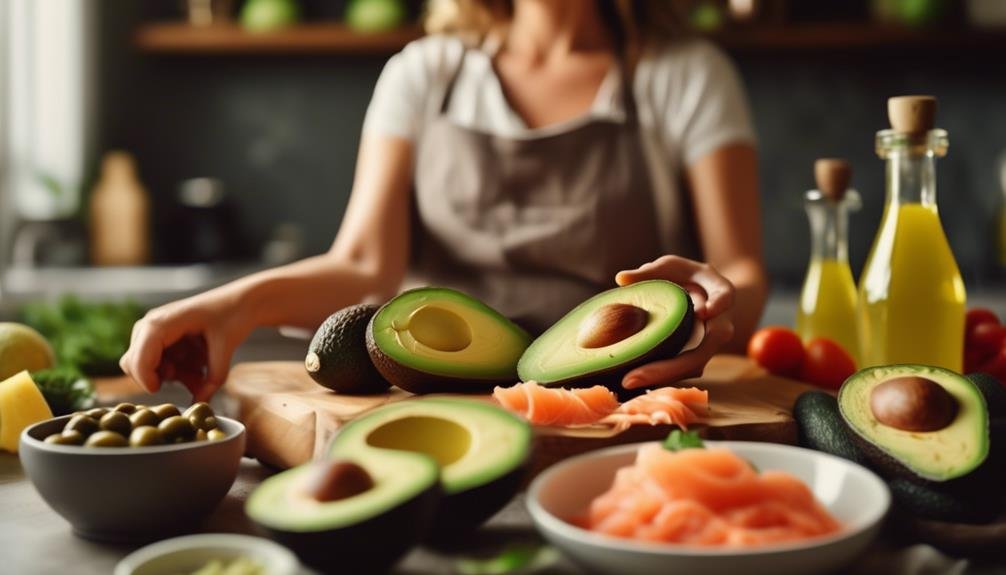
To ensure the best nutrition for your baby, it's important to make informed choices when it comes to selecting healthy fats for their diet. One way to do this is by making homemade baby food. By preparing your baby's meals at home, you have control over the ingredients and can ensure that they're getting the right amount of healthy fats.
Incorporating healthy fats into your baby's daily meals is essential for their growth and development. Healthy fats, such as those found in avocados, olive oil, and salmon, provide important nutrients that support brain development, immune function, and overall growth. Including these fats in your baby's meals can also help with the absorption of fat-soluble vitamins, such as vitamin A, D, E, and K.
When making homemade baby food, you can easily incorporate healthy fats into purees, mashed foods, and even finger foods. For example, you can add a teaspoon of olive oil to pureed vegetables or mix mashed avocado into cereals or yogurts. Another option is to introduce small amounts of cooked and flaked fish into your baby's diet, as it's a great source of omega-3 fatty acids.
Frequently Asked Questions
Can Infants Consume Too Much Healthy Fat?
You should be cautious about giving infants too much healthy fat. Excessive fat intake can pose risks to their health. It's important to follow guidelines for introducing healthy fats to babies to ensure their well-being.
Are There Any Risks Associated With Introducing Avocado Into a Baby's Diet?
Introducing avocado into your baby's diet poses minimal risks. Avocado is packed with healthy fats that promote brain and eye development. However, monitor for allergic reactions and consult your pediatrician before introducing any new food.
How Can I Incorporate Nut Butter Into My Baby's Meals?
To incorporate nut butter into your baby's meals, you can spread a thin layer on toast or mix it into pureed fruits or vegetables. It's a great way to introduce healthy fats to infants through different recipes.
Is It Safe to Introduce Olive Oil to My Baby's Meals at an Early Age?
Yes, it's safe to introduce olive oil to your baby's meals at an early age. Olive oil is a healthy fat that provides essential nutrients. Just remember to use it in moderation and gradually increase the amount as your baby grows.
What Are Some Creative Ways to Include Chia Seeds in My Baby's Diet?
To include chia seeds in your baby's diet, try mixing them into pureed fruits or yogurt. Chia seeds are a great source of healthy fats, which are important for your baby's growth and brain development.
Conclusion
In conclusion, incorporating healthy fats into your infant's diet is essential for their brain development, growth, and overall health. Omega-3 fatty acids, monounsaturated fats, and polyunsaturated fats all play important roles in supporting your baby's well-being.
Introducing foods like olive oil, chia seeds, and coconut oil can provide these beneficial fats. Making informed choices about the fats you include in your baby's meals can set them up for a lifetime of good health.
Start nourishing your little one with the power of healthy fats today.


